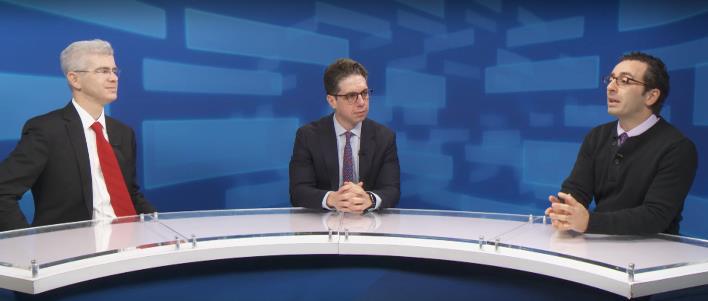Joshua Brody, MD, Richard Bakst, MD, and Amir Steinberg, MD, of the Icahn School of Medicine at Mount Sinai, New York City, discuss updates on the management of patients with small lymphocytic lymphoma (SLL) and chronic lymphocytic leukemia (CLL). The conversation includes discussion on radiation therapy for early-stage small lymphocytic lymphoma (SLL), testing for early-stage CLL, current management strategies, and future directions.
For those with early stage SLL, the first video is particularly interesting, as it discusses the successful use of low dose radiation for palliative management of SLL when the SLL is localised and there is no bone marrow involvement. Radiation treatment dosage is similar to that experienced on a transcontinental flight and can be repeated if needed, several years later. It can also be used very successfully to treat a swollen spleen with even less radiation. Professor Terry Hamblin, the highly regarded CLL researcher who discovered the importance on IgHV mutation status, considered radiation treatment potentially curable for early stage SLL, yet I rarely hear it mentioned.
The videos are 5 to 10 minutes in duration, but sadly with no transcript or means to change the video speed.
Video 1: Management of early-stage SLL
Video 2: Management of early-stage CLL
Video 3: Current management strategies for CLL
Video 4: Future directions in the management of CLL
mdedge.com/hematology-oncol...
In related news, Clinical Care Options have a program for specialists:- Optimizing Decision-Making in CLL in an Era of Novel Agents. Dr Anthony Mato, Associate Professor at the Memorial Sloan Kettering Cancer Center in New York City discusses Ibrutinib Plus Rituximab and the Expanding Therapeutic Toolbox for Previously Untreated CLL.
Given the wealth of targeted therapies available for frontline CLL treatment, how does one select one drug vs another in the absence of head-to-head comparison data for each of these agents?
In my practice, I tend to administer ibrutinib as a monotherapy based on the data showing limited additive value of rituximab to ibrutinib. However, if I am being a purist, I would say that one could select the combination of ibrutinib plus rituximab for patients who are similar to those in the ECOG 1912 trial: younger, fit patients with no previous therapy who are candidates for fludarabine/cyclophosphamide/rituxi
The second-generation BTK inhibitor acalabrutinib was recently approved in the frontline setting based on the phase III ELEVATE TN trial, which demonstrated a significant PFS benefit with acalabrutinib alone or in combination with the anti‑CD20 antibody obinutuzumab when compared with obinutuzumab plus chlorambucil. This is another regimen with the potential to use the BTK inhibitor alone or in combination with an anti‑CD20 antibody. A notable difference with ELEVATE TN is that this trial did show a benefit with the addition of obinutuzumab to acalabrutinib (albeit in a post hoc analysis that was not powered to detect statistical significance). However, in my practice, I generally give acalabrutinib as a monotherapy as well.
The major reason I have hesitated to incorporate anti‑CD20 antibodies in combination with BTK inhibitors in my practice is that the BTK inhibitors are given as continuous therapies regardless of the addition of an antibody. Although the anti-CD20 antibody likely deepens the response, we do not yet have data to determine whether or not we could shorten exposure to the BTK inhibitor in the setting of combination therapy.
The BCL-2 inhibitor venetoclax is also approved for frontline CLL in combination with obinutuzumab, based on the phase III CLL‑14 trial. In that study, venetoclax plus obinutuzumab led to significant improvement in PFS and higher MRD negativity vs chlorambucil plus obinutuzumab. The major advantage of this combination is that it is a time‑limited 12‑month therapy where venetoclax is given for 12 months and obinutuzumab is given for a total of 6 months.
Selecting among regimens can be challenging, and one must consider the patients, including their age, fitness, past medical history, active comorbidities, and treatment preferences.
clinicaloptions.com/oncolog... (Registration limited to medical practitioners)
If you are US based and at all unsure of your specialist's treatment recommendation, you may be eligible for a free video consult with a CLL specialists through the CLL Society's Expert Access program. cllsociety.org/cll-society-...
"To participate in the Expert Access Program, you must reside in the United States and have a CLL diagnosis, without current access to a CLL expert. If you are unsure if you are already seeing a CLL expert physician, check our list of CLL expert doctors here."
cllsociety.org/toolbox/cll-...
This is an unlocked post: healthunlocked.com/cllsuppo...
Neil
